News Digest
Published on Monday, June 1, 2015
By: Gary Pettus at 601-815-9266 or <a href="mailto:gpettus@umc.edu">gpettus@umc.edu</a>.
Published on June 01, 2015
A quick look at Medical Center news
Life-saving liver transplant marks Medical Center milestone
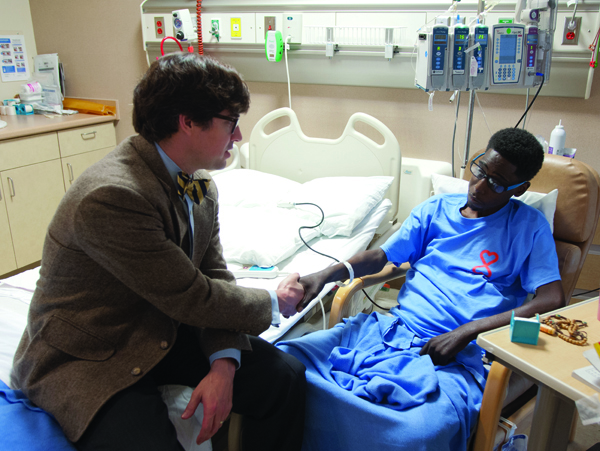
UMMC abdominal transplant surgeon Dr. Mark Earl visits Utica resident Dennis Mitchell, 33, who on April 14 received the 50th liver transplant since the Medical Center’s program was jump-started in March 2013.
When Utica resident Dennis Mitchell received a new liver April 14 at the Medical Center, it greatly improved his chances of enjoying a normal life.
It also marked a milestone for UMMC. Mitchell received the 50th liver since the 2013 jump-starting of UMMC's long-dormant liver transplant program.
His procedure was a proud undertaking for his surgeons, Dr. Mark Earl and Lucedale native Dr. Christopher Anderson, who was recruited to UMMC in August 2011 with a mission: Bring back the liver transplant program following a 20-year hiatus, and build an abdominal transplant team to keep that momentum going.
"We're doing world-class transplants in terms of complexity. We've built the team and support staff to do it here," said Earl, assistant professor of surgery and one of Anderson's 2012 recruits. The East Texas native formerly was an abdominal transplant surgeon at Oregon Health and Science University and had trained with Anderson for a decade before that.
"New transplant programs don't come up very often, especially for liver. They struggle to do what we're doing. The majority wouldn't even consider tackling what we've done," Earl said. "We're pleased, but we still have a lot of growth to come."
That first liver recipient, on March 5, 2013, was south Jackson resident Karen Battle. Like many who followed her, she is honoring her second chance at life after living with crippling autoimmune hepatitis.
"That's so hard to believe," she said of the transplant team's 50th procedure. "If it wasn't for this program, I probably wouldn't be here."
In the years before Anderson arrived at the Medical Center, Mississippians had no choice but to leave the state for a liver transplant, with the closest programs located in Alabama and New Orleans.
Mitchell, 33, who suffered a debilitating gunshot wound to his abdomen during an altercation at a club in 2008, lay in a UMMC hospital bed in the days before his transplant, sickened to the point that he needed a liver quickly in order to survive.
"He told me that if they didn't find me a liver, I wasn't going to make it," Mitchell remembered Earl saying. "He said it was up to me to take care of myself after that."
UMMC, Holmes County chew over 15th anniversary together

Celebrating UMMC Holmes County’s 15th year under UMMC’s leadership are, from left, Kevin Cook, CEO of University Adult Hospitals and Clinics; Carla Stanley, chief nursing officer and chief of clinical services for UMMC Holmes County and UMMC Grenada; Paige Lawrence, clinical director at UMMC Holmes County; Claudette Hathcock, director of human resources for UMMC Holmes County and UMMC Grenada; and David Putt, CEO of UMMC Holmes County and UMMC Grenada.
Fifteen years have transformed University of Mississippi Medical Center Holmes County from a small rural hospital into a significant critical access facility and a trailblazer in using telehealth to heal patients.
And the last year alone, chief executive officer David Putt says, has brought even more change for the 25-bed hospital in Lexington that's in the midst of a $4 million renovation that includes a transformed Emergency Department.
Since April 2014, "admissions are up by 32 percent, and traffic in our Emergency Department is up 15 percent," said Putt, who also serves as CEO of UMMC Grenada. Radiology services are up 11 percent and clinic visits 10 percent over last year, he said. The hospital this year anticipates about 500 admissions and 9,000 patient encounters of all kinds.
That growth, and UMMC's 15th year as a presence in Holmes County, were reasons to celebrate May 13 as all three UMMC campuses observed National Hospital Week. At UMMC Holmes County, employees feasted on barbecue, burgers and the trimmings and enjoyed sheet cakes decorated for the occasion.
Constructed in 1950 as Holmes County Community Hospital, the facility was renamed Holmes County Hospital in 1981. It came into UMMC's hands in 2000, and about a decade ago became one of Mississippi's critical access hospitals providing care for patients with acute illnesses or conditions that require observation or hospital admission.
Former department store to stock up on telehealth services
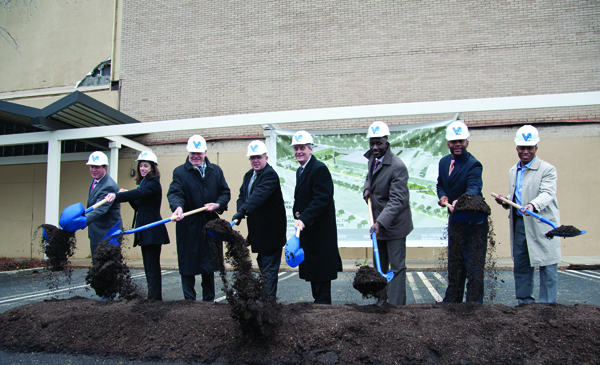
State and city leaders and UMMC representatives join Scott Thompson, fourth from left, founder and CEO of Venyu Solutions, during a February groundbreaking for the Venyu Technology Center, which will include a newly constructed building to be leased by the UMMC Center for Telehealth.
A Baton Rouge, La.-based data company set its sights on Jackson and announced in February that it will build a technology center that, in part, will house one of the University of Mississippi Medical Center's fastest growing services - telehealth.
UMMC entered into a lease agreement with Venyu Solutions, LLC, which will construct a stand-alone, 16,000-square-foot facility to accommodate the increase in the services UMMC's Center for Telehealth provides to hospitals, clinics, corporations and patients across the state. The lease will begin on or around July 1, 2016.
The Venyu Technology Center will be constructed at the site of the former McRae's department store on the corner of Meadowbrook Road and State Street in the Fondren neighborhood. In addition to the new building, existing structures such as the former McRae's building will be renovated to host a data center for Venyu, with plans for other businesses in the future.
"We are proud the University of Mississippi Medical Center has selected our new Technology Center in Jackson to help host their telehealth operations," said Scott Thompson, founder and CEO of Venyu. "We greatly look forward to the positive impact these new services will have within the community."
The technology center site falls in line with a health-care corridor that's been lauded by state leaders.
Gov. Phil Bryant said the new center will create nearly 400 jobs for Mississippians.
Most of the new technology center's structures already exist, but the building to house the UMMC Center for Telehealth is being specifically designed to meet the growing demand for the services around the state, said Dr. Kristi Henderson, chief telehealth and innovation officer.
The telehealth program averages 8,000 consultations a month nowadays, said Henderson, pointing to that figure as a sign of healthy growth.
Medical students make gift of cells to ‘save a stranger’
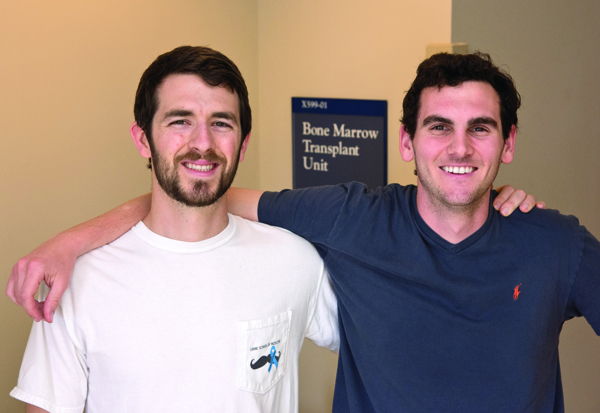
Medical students John Howard, left, and Ian Mallett entered the national Be the Match program as possible bone marrow or stem cell donors. Howard matched as a stem cell contributor, Mallett as a bone marrow donor.
Each entered medical school to save lives. Each got the opportunity to try before they began seeing patients.
Ian Mallett and John Howard, who finished their second year of medical school in May at UMMC, have donated bone marrow or stem cells to individuals whose lives were threatened by leukemia. As of April, a third M2 student was on standby in case the primary donor was unable to donate.
"This is an opportunity to save a life and you don't have to do anything special," Mallett said.
"That's the reason we're here," Howard said.
Mattie Coburn, donor center coordinator and recruiter for the Mississippi Marrow Donor Program, said that in the 15 years she's worked with the donor program, she's never seen three students from the same class identified as possible donors in the same year or seen two who made donations in the same year.
Mallet and Howard signed up for the National Marrow Donor Program's Be the Match Registry, part of an international program to match donors with those who need the life-saving transplants. Mallet signed up at a drive at the University of Mississippi. Howard did so at a drive at UMMC.
The Mississippi Marrow Donor Program, a part of the National Marrow Donor Program, coordinated their gifts.
For five days before his donation Howard received shots to enhance his stem cell count. Then came four to five hours of apheresis. The process uses a machine to take blood from one arm, remove the stem cells and return the remaining blood to the other arm.
Mallett's bone marrow donation involved surgically removing the marrow from his hip, an overnight hospital stay and a longer recovery.
Would they do it again? "Oh, yeah, definitely, without a doubt," Mallett said.
Mallet made his donation in memory of a classmate, Pricilla Li, who died in December.
The M2s have established a scholarship in her name, with plans to award it to an M2 who embodies her spirt of selflessness and care.
To donate to the scholarship fund in memory of Pricilla Andrea Li, go to www.umc.edu/pricillalischolarshipfund/.
To join the Mississippi Marrow Donor Program or to set up a drive, call Mattie Coburn at University Cancer Care's Division of Hematology at (855) 866-2362. For more information on donations, visit http://www.ummchealth.com/Health_Care_Services/Cancer/Adult/How_to_Help/Donate_Yourself/Donate_You.
Endowed fund allows you to pay homage to Chancellor Jones

To honor Chancellor Dan Jones' service to the Ole Miss community, the University of Mississippi has announced the Daniel W. Jones, M.D. Chair for Faculty Support.
The fund will establish an endowed faculty position, which will rotate between schools and colleges on the Oxford campus.
Ole Miss leaders ask UMMC faculty, staff and alumni to consider contributing to the fund, which will be a lasting initiative honoring one of the university's most beloved and effective leaders.
For more information about the fund, or to contribute, go to https://ignite.olemiss.edu/.
‘CRITTers’ group strives for ‘town and gown’ teamwork
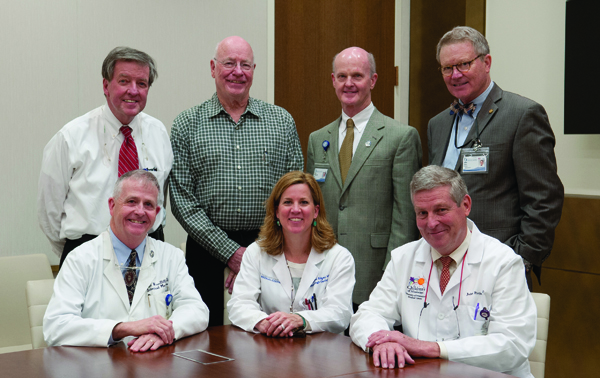
Members of CRITTers, the acronym for a committee formed to improve relations between university physicians and the community’s private-practice doctors, reunited on March 25 to discuss their progress and the restructuring of the Office of Physician Relations. They are, back row, from left, Dr. Bryan Barksdale, Dr. James Keeton, Dr. Charles O’Mara and Dr. Jim Sones; front row, from left, are Dr. Dan Woodliff, Dr. Mildred Ridgway and Dr. John Purvis.
In the medical world, there can be a persistent, prickly relationship known as "town vs. gown" - academic vs. private practice medicine, university physicians vs. community doctors.
Between the institutions and the surrounding community, the distinction, and possibly the mutual suspicion, has been around for ages - at least as far back as the medieval period, when university students and teachers wore scholars' gowns that distinguished them from the other townspeople.
One of the most divisive issues, at least today, involves patients - who cares for them and where.
Recognizing that this type of competition is not always healthy, the Medical Center is trying to shrink this rift through the efforts of a committee that and bears the acronym, CRITTers.
Our goal is to convert "town vs. gown" to "town and gown," said Dr. John Purvis, associate professor of orthopaedics, and a member of the Vice Chancellor's Ad Hoc Committee for Community Relations Improvement.
CRITTers, which held its first meeting in August 2013, reconvened on March 25 for an annual reunion and to hear the results of its effort to restructure the Office of Physician Relations, now led by Purvis.
Dr. James Keeton, who recently stepped down as vice chancellor for health affairs and dean of the School of Medicine, mandated the CRITTers initiative.
"Dr. Keeton charged us as a group to serve as a kind of community relations improvement think tank, from which the acronym CRITTers evolved," said Dr. Charles O'Mara, associate vice chancellor for clinical affairs.
Made up of about a half-dozen faculty members who, like Keeton and O'Mara, were previously in private practice, the committee has met 10 times over several months to address the concerns of physicians working inside and outside the Medical Center. Other UMMC faculty members and administrators also met with the committee to consider improved community relations in research and training, as well as in clinical care.
Fondren investment foreseen as boon for medical corridor
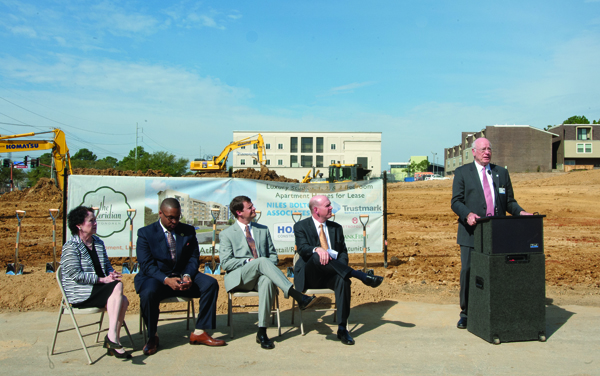
Former University of Mississippi Medical Center Vice Chancellor Dr. James Keeton, at podium, welcomes visitors to the groundbreaking ceremony for the Meridian, a $33 million apartment home development on Lakeland Drive across from the UMMC campus. Joining him are, from left, Jackson Ward 7 Councilwoman Margaret Barrett-Simon; Jason Goree, city of Jackson economic developer; John Ditto, a partner in the StateStreet Group; and Stewart Speed, a partner in SKD Development.
The Meridian at Fondren, a $33 million apartment home development on Lakeland Drive fronting the University of Mississippi Medical Center, is a perfect example of public and private sectors coming together for the good of the community and state.
That's the message delivered by the project's partners, UMMC administrators and city officials during groundbreaking ceremonies on March 18 at the 4.4 acre construction site that backs up to Fondren's Woodland Hills neighborhood. About 15 months from now, the five-story Meridian's studio units plus one-, two- and three-bedroom apartments are slated to be occupied by up to a total 500 residents.
It's a joint project of SKD Development, the StateStreet Group and Kassinger Development Group, whose partners welcomed investors, architects, and financial and construction companies to ceremonies that attracted more than 100 supporters.
'What makes the Meridian project so exciting is that it meets the needs of Fondren on so many levels," Stewart Speed, a partner in SKD Development, said of the vibrant business, residential and entertainment district off downtown that's fast becoming known for its walkability.
"The Fondren area badly needs quality residences, and the medical corridor needs significant private development to act as a catalyst for future growth."
‘Our first job offer’ means suspense, exhilaration reign on Match Day 2015
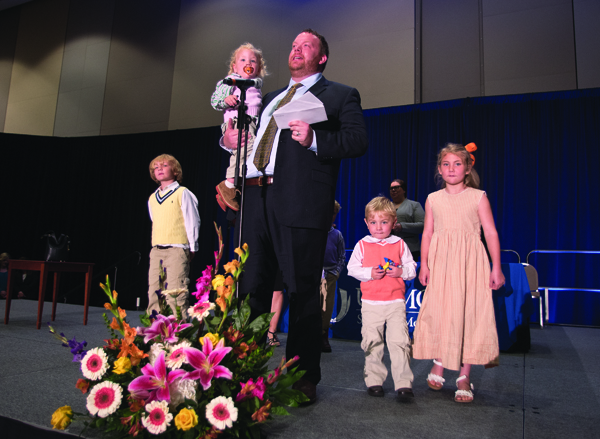
Eric McDonald, the father of six children, announces his residency match to UMMC in emergency medicine.
There were 1,000 seats at the Jackson Convention Complex on March 20 for the School of Medicine Match Day 2015, and a large chunk of them were filled by Eric and Heather McDonald's children.
All six of them. Ranging in age from 8 years to eight weeks[at the time], they may not have known exactly why they were there, but the oldest knew this much, McDonald said: "It's a special day for daddy.
It was a special day for hundreds of dads, moms, grandparents, siblings and others - but, most of all, for the fourth-year medical students who, like
McDonald, learned where they'll complete their medical education as residents training in 21 different specialties, such as pediatrics, surgery, emergency medicine, family medicine, internal medicine and more.
"It feels like it's been a long time coming," said McDonald, who lives in Florence and grew up in Clinton. "But it's been different from what I expected - I knew there would be all the excitement, but then I realized that a bunch of close friends are about to get dispersed across the country."
Nationwide, more than 27,000 first-year residency positions were filled simultaneously in this year's Main Residency Match involving the nation's 141 medical schools. Almost 35,000 U.S. and international students applied, reported the Association of American Medical Colleges. UMMC's Match Day list included more than 120 names.
John Bridges, senior class president, acknowledged that Match Day is steeped in emotion and suspense. "For a lot of us, this is our first job offer," he said to the convention center crowd.
Match Day is an especially nerve-wracking time for students like Zach and Kelly Pippin, who married during their third year of medical school and who, of course, aspired to match matches.
"They put everything into a computer, and I've heard it takes only 17 seconds," said Kelly Pippin, who, like her husband, chose a residency in internal medicine. "In a matter of 17 seconds, our fate is determined."
The Pippins matched together at UMMC.


